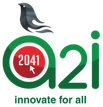Open Data
Ensuring availability of digitally reusable data on the web to enable better public service delivery, research, new job opportunities, investment and transparency and accountability in the government.
How is Open Data useful?
In 2016, the flood situation in Jamalpur district in Bangladesh got worsened as the nearby Jamuna River swelled and flowed 121 centimeters above its danger level. The water level crossed its previous record of 112cm above the danger level that happened in 1988. Many schools, colleges gradually got submerged as the water rose. The authorities could not foresee when which establishment would go down to the flood as they lacked all-important digitally analyzable data to make such predictions. They used guesswork that often resulted in the suffering of the people and damage or loss of valuable properties. If relevant ministry and departments like Ministry of Disaster Management and Relief, Flood Forecasting and Warning Centre, Bangladesh Bureau of Educational Information & Statistics, Water Development Board etc. had opened on the web in digitally analyzable form their data on water flow, GIS of schools, colleges, and rivers then the authorities could use it for such forecasting. Likewise, it will immensely benefit the citizens if public and private organizations share on the web such serviceable data on various issues like health MIS, transport, hospital, stock exchange etc.
a2i has been the leader in the Open Data initiative in Bangladesh
With a view that it is a governance issue that reinforces the right to information and has massive potential to empower all classes of people. In the context of Bangladesh, open data is critical to ensure effective public services.
The objectives of open data are:
a2i’s goals
Present scenario
a2i along with the United Nations Department of Economic and Social Affairs (UNDESA) and Bangladesh Bureau of Statistics have been implementing Open Government Data (OGD) in Bangladesh to achieve some of the goals of SDG. An OGD Working Group to act as a central point of reference for people and an Executive committee as controlling authority for the strategic aspects have been formed as part of the OGD Management System in Bangladesh. National capacity development workshops and programs are going on for sensitizing national stakeholders, integrating information on the initial gap assessment, identifying demands for data sets and carrying out strategic planning. The development of a portal (data.gov.bd) to provide an easy way to find, access and reuse data are at the final stage of its development. To achieve the “Data for All” objective a strategy paper to guide the stakeholders has received the necessary approval.


